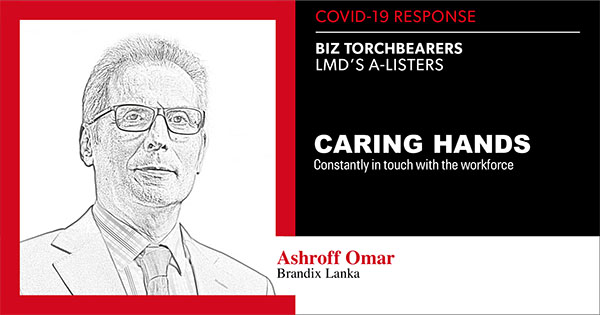Q: How has your group played a part in mitigating the impact of the COVID-19 crisis?
At the outset, we prioritised the health and safety of our people – a precedent across our business.
Securing the wellbeing of our 60,000-plus employees and implementing stringent measures to restrict COVID-19 from affecting our network was the foremost priority.
From a production perspective, we went into action with our business continuation planning playbook. We explored a transition to utilise our capacity, resources and expertise to address the global demand for personal protective equipment (PPE) production to contain the spread of COVID-19.
The apparel industry is a vital export revenue generator for Sri Lanka – to the tune of US$ 5.6 billion in the past year. This global crisis has been the toughest predicament experienced by the industry in its history; it has compelled us to accelerate change and rethink everything we do.
Despite the challenging conditions and volatile journey ahead, we must continue to do our part to combat the pandemic by ensuring a consistent supply of PPE while bringing in revenue to sustain the national economy.
Q: In what spheres has this assistance made a mark?
What once started as a health crisis is now posing serious threats to the global economy and industries worldwide. The supply chain infrastructure for PPE across the industry needed to promptly adapt and function in a more resilient manner to meet the rising global demand.
In these circumstances, it was critical that Brandix along with other manufacturers was capable of providing a consistent supply of PPE while managing the challenges posed by physical distancing, market lockdowns and export bans.
Despite these limitations, we were able to secure an order to produce 200 million face masks for the US – a vote of confidence in Sri Lanka’s resilience and dependability.
We were proud to hand over the first batch for export to Special Representative of the President and Head of the Presidential Task Force on Economic Revival and Poverty Eradication Basil Rajapaksa, and the US Ambassador to Sri Lanka and the Maldives Alaina Teplitz in mid-May.
Q: As far as the workforce is concerned, how did your organisation assist people during the curfew?
The prolonged curfew took a toll on people and businesses, impacting financial stability and mental wellbeing, and inflicting a sense of uncertainty worldwide. Therefore, it was important to address the issues our employees faced and provide some relief amid the limitations posed by the crisis.
With technology, we stayed connected with our people. When we recommenced operations on a small scale at some of our facilities in Sri Lanka, every precaution was taken in compliance with government protocols.
We addressed the mental wellness of our employees through counsellors who ensured constant communication despite most employees being away from factories and offices. And we provided ration packs and study packs to our associates.
Additionally, we launched Brandix ‘Abhisheka’ – an online marketplace – via Facebook for our associates to pursue and enhance their entrepreneurial ventures with our assistance.





